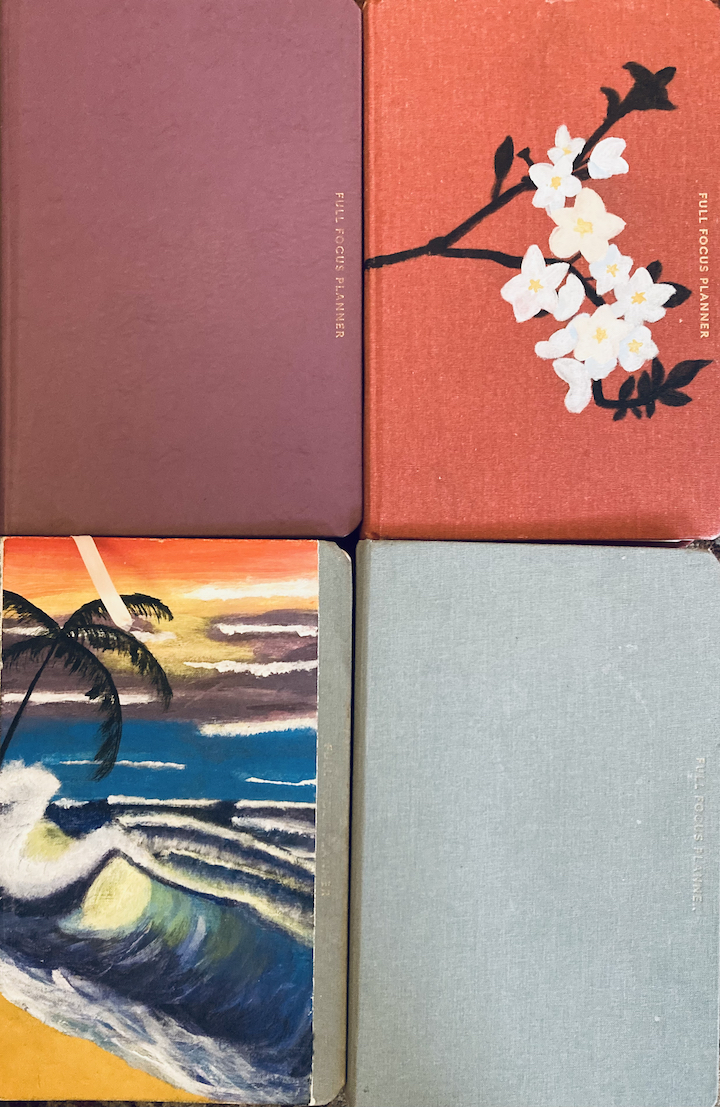 |
My 2022 Full Focus Planners
I painted Quarters 2 and 3. |
This is my honest review of the Full Focus Planner. This post is not sponsored.
What symptoms did the Full Focus Planner address for me?
- 1,000 tasks in my brain at a time
- No idea where to start
- Long-term projects being pushed to the last minute
- Feelings of discouragement for "not doing anything today"
- Little tasks getting lost in the shuffle
How did it address the symptoms?
- Key Projects section - List your most important tasks for the upcoming quarter. Other Tasks and Notes spaces on Daily pages. Weekly Overview space where I keep rolling over tasks.
- Ranking my most important goals and projects. Using the Goal Detail pages to break down the goal into action steps. Sending these action steps to Weekly Big 3 and Daily Big 3 pages.
- Using calendar pages and quarter pages to set regular deadlines for the action steps.
- Feelings of encouragement from checking off my Big 3 each day and saying I accomplished important things today.
- Checklist-style entries with a key with symbols to code if the task is finished, waiting for something, deferred, delegated, or deleted. Tasks that are not completed or deleted get sent to the following day.
How did I learn about the Full Focus Planner?
Last year, my husband became interested in Full Focus through a podcast. One product they make, their Full Focus Planner, really caught his interest. I was very skeptical of this system because of the expense and also because I had experience trying planner systems that were far too cumbersome to set up or set up but with not enough space. I abandoned those systems and found that I was making long lists on loose-leaf paper and leaving them around the house. I would hang on to this list of never-ending tasks and feel bad daily for not accomplishing anything.
After using this method for a few quarters, my husband was keeping work at work and coming home when he planned and being present. He was more organized and positive.
My husband wanted me to try this method too, but I was reluctant. Like the Bullet Journal method, this planner required a lot of front-end setup. It was also a very expensive system because you need 4 planners for one year.
In contrast to the Bullet Journal, however, I didn't need to create my planner from scratch, which eventually became a chore. In contrast to a yearly planner, Full Focus had equal space for each day of the week rather than shrinking Saturday and Sunday.
I was very skeptical that this would help, but I was getting annoyed by the recurring reminders on my phone (to the point of ignoring them!) and my loose-leaf paper wasn't organized or motivating.
At the beginning of 2022, my husband bought the Best Year Ever course from Full Focus and encouraged me to watch with him. Almost immediately I was sold on this method as I realized they were using a researched-based approach to help people reach their goals. I was already learning how to implement challenging limiting beliefs and all-or-nothing thinking using Cognitive Behavioral Therapy techniques and this planner is built specifically to implement those challenges.
How is the Full Focus Planner structured?
The
Full Focus Planner is a quarterly planner that is centered around goal setting. To start small, the Start Here page gives a Simple Setup: On the first Day page, list your top 3 tasks for the day. This is called your Daily Big 3. Check them off as you accomplish them. Just 3 tasks. There is a list for other tasks below the Big 3, but the Big 3 are the tasks that have priority for accomplishing your goals and to help you feel like you did something today.
I use the Big 3 to remind myself to plan piano lessons, send piano lesson notes, plan music for Sunday worship, email my band and AV team, post a blog, read to my daughters, and clean my apartment. Each Day page also has a schedule column where I list my lessons and other appointments. I also draw boxes to show how I will use my time: cooking, cleaning, or writing music.
The Weekly Preview is my favorite tool. After the end of a week, the first section has you review what you did and write down 3-5 of your Biggest Wins. I can't begin to express how much just sitting down and reviewing what I actually did objectively has done for how I view myself. Lazy? No. Doing the best I can with what I have? Yes.
Previously, I would complain to my husband about how lazy I am and that I didn't accomplish anything. Then I would proceed to list doing the dishes, picking up a toys, going to the park with the girls, and making lunch. I was accomplishing tasks, but I didn't record them, so I didn't remember them, and I felt discouraged and even shame about myself. Now, I look back and see that I put together a worship set list for Sunday, I had guests over on Friday, I published a blog post, I turned in a competition entry, I made a craft, and planned a piano lesson.
On the Weekly pages, you get to set a Weekly Big 3 to advance your goals and projects and at the end of the week and gauge how far you got. There is space to review your week for what to keep, improve, start doing or stop doing. I usually roll over a list of tasks in another space and have decided to use large post-it notes so I'm not rewriting long term tasks multiple times.
Another helpful tool has been the space for writing down appointments for the week. Even though they are on my phone, reviewing and writing them down helps me to be prepared ahead of time. The last part gives space for planning self-care. I use this space on and off, but I want to set a goal to focus on how I can rejuvenate myself.
To sandwich the book, the front gives lots of space for goal setting for the year. I highly suggest
learning the SMARTER goals format. Next are blank calendar pages including full box calendars for the 3 months of the quarter and additional list pages for the remainder of the year known as Rolling Quarters.
The back of the book has a quarterly preview which is a review of the previous quarter and a time for planning the next quarter, giving steps for setting up the next one. An index is in the very back for any notes you've made over time that you would like to find later.
Additional favorite features of mine include the back pocket that is the perfect size for inserting a Moleskine notebook and inspiring and motivating quotes on each page of the planner.
Did I have my Best Year Ever?
Yes. I consider my mood boost from reviewing my weeks and quarters (and in the next few days, my year) similar to eating chocolate except the benefits are long-lasting and actually change my negative beliefs about myself. These positive feelings towards myself are based in reality and I have physical evidence to prove it. I have been less anxious about completing projects and whether or not I will have enough time. My goals are set according to my values and not what I think I'm expected to do by others, so I get intrinsic rewards from my accomplishments even if I don't have a sushi date or cream cheese danish waiting for me on the other end of a project. Although those treats are a good idea, so maybe I'll treat myself for a great a 2022.
What annual goals did you specifically accomplish?
I haven't done a year in review after having used this system, but I imagine my comparison to last year will show that, while last year I did do a number of things that I hadn't formerly considered accomplishments, this year I purposely had goals and I purposely accomplished them.
My 2022 planned and accomplished goals:
- Have a fully licensed business by
August 21 ??? Whenever Chicago can figure it out - Status: Completed, but much later than August 21st.
- Teach my 5-year-old how to read daily and finish lesson book by April 30
- Status: Completed by May 7
- Post 1 composition a month on Soundcloud, Pond5, and/or Arrange Me
- Status: Completed on time
- Finish reading Daring Greatly by Brené Brown by March 31
- Status: Completed on time
- Read the Bible 4 times a week (48 times) by September 30
- Composition Competition by April 30
- Status: Completed. "The Voyage Home"
- Composition Competition Entry by July 31
- Status: Completed "Save the Sheep!"
- Spend quality time with my daughters everyday by December 31
- Status: Completed, however I didn't track this.
- Symphonina Competition Entry by December 15
What planned goals were not accomplished?
It is true that not all goals get accomplished with this system. Realities set in, such as too many invasive weeds took over our shared backyard (4), concertos are very, very hard (goal 1), habits are hard to form and maintain (2, 3), and sometimes saying no to one project means getting to say yes to another (5).
- Memorize Romance movement from Chopins' Concerto in E Minor (8 ½ pages) by June 5
- Do physical therapy or yoga every morning (80 times)
- Status: Abandoned despite the reward of cheesecake...
- Practice piano every morning for 30 minutes at 6am (60 times) by March 31
- Status: Partially completed (I have a ~ in the checkmark box)
- Plant lawn and garden by May 31st
- Status: I have an indoor tomato plant I grew from a seed. Hoping for a better season in 2023.
- Composition Competition Entry by October 31
- Status: Abandoned in favor of the Symphonina Competition
In addition to these annual goals, I had a number of smaller projects that came up over time that were also accomplished or abandoned, but they are less interesting and more mundane, such as cleaning and paperwork.
Conclusion
The Full Focus Planner is worth the cost. The productivity increase and mood boost has been absolutely priceless. I highly recommend this system for everyone whether you are a stay-at-home mom like me or a manager like my husband. They even have a youth version.
It is so much more than just a planner; it is a way to capture the truth about what you accomplished in a year and to challenge the negative beliefs about yourself and how you spend your time. Everyone has different values and our goals reflect that.
I hope if you try this system, you also find that you are able to do things you dreamed of accomplishing, such as me orchestrating compositions, but didn't know where to start.
If you have any questions or comments, please let me know below!
Have a happy New Year!
-Jenny





No comments:
Post a Comment